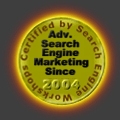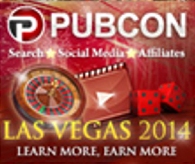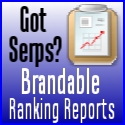 Look how old this is!
Look how old this is! I post at SearchCommander.com now, and this post was published 16 years 11 months 16 days ago. This industry changes FAST, so blindly following the advice here *may not* be a good idea! If you're at all unsure, feel free to hit me up on Twitter and ask.
You may have a degree in English, but writing for the Web is a little bit different than writing for other forms of media.
In the back of your mind you have to be a little bit more conscious about your audience is, and you have to grab their attention, as well as that of the search engines.
The following list is designed to help you see the big picture when writing or editing content for a webpage.
I believe they are the 10 most important things to remember, but would love to see input from anyone else in the comment section below.
1. Write For Readers, and Not for Search Engines
People today have a shorter attention span than our parents, and they’re getting even shorter. We decide in a split second whether we’re going to stay or leave a web page, and if we can’t easily scan it then we just ignore it, and hit the back button.
You have to make the page easy for the reader to grasp in the blink of an eye, letting them know exactly what’s in it for them to stick around.
In doing so, you’re also making it easier for the search engines to determine the subject and context of your pages as well. I firmly believe that easy reading clean pages also make for easy spidering.
2. Make Content Easy to Digest
Break up your paragraphs into short visually pleasing chunks, and use the enter key manually to make this happen. Even though it may not be 100% grammatically correct, and your English teacher would cringe, force yourself to hit that key and create new paragraphs.
A general rule of thumb I use is to never have more than 5 lines shoved together, and the only reason for going all the way up to 5 lines is because 2 paragraphs won’t effectively stand on their own with the allotted page width.
3. Use Meaningful Headlines
Besides making the headline for your article try to use additional headlines or bolded headlines wherever they are appropriate, based on your pages content.
Don’t get hung up on the word “keyword”, but obviously, you should use subject relevant words, phrases and synonyms for these headlines, which will both draw the eye, and convey relevance to the search engines.
Never stuff stupid sounding phrases into your text, just to pump up the likelihood of ranking higher, because the search engines aren’t that stupid (anymore).
Instead, throw your preconceived notions about “keyword density” out the window, and just write relevant content, using decent grammar, that will inform your readers..
Since people scan what they read, their eyes are going to stop on the headlines, and these bolded phrases also tell the search engines what the page is about too.
The technical answer to whether <H> tags or bold is actually “better”, only matters to the true search geek. The mere fact that you are using the headlines to attract the eye on the page is enough, and for ranking, in the end, it’s probably going to come down to inbound links link anyway, so just use bold. There’s a button for the B and it’s faster, so you’re more likely to use it!
4. Make Lists
People like lists for a variety of reasons, and it’s fairly easy to work them into a document as a way of proving a point. Eye tracking studies show that people’s eyes stop on lists as well.
If you’re even moderately clever you can even squeeze small lists into long documents to break up the monotony of having hundreds or even thousands of words on a page. Lists can make the page look more digestible.
5. Use Bullet Points
When you’re writing a long piece of content you can really hammer home a point by using bullets within your text. Also, just like people, the search engines eat these up and place more relevance on sections of text that include bullet points.
If you can have those bullet points be links to other relevant areas of your site, that are not on your main navigation, you’re going to add more authority to that page, and to the pages you link to.
- Bullet points are easy to add
- Bullets points are easy to read
- Bullets points are easy to understand
6. Get to the point
I’m sure I’m frequently guilty of using flowery prose, and of course we’re all going to stretch the content once in a while and try to get a couple more instances of our chosen keywords into the article, but don’t overdo it.
Besides, if you’ve got enough information to fill a 2000+ word piece of content, then you can write three or four smaller ones, or break it up into smaller sections and subsections that include lots of headlines. Otherwise people will just not take the time to read it all, or even scan it fully, while they are scrolling past it.
7. Use Images
The extra time it takes you to break up text with images is easy to justify if you’re trying to attract thousands of people to stay on your page, and for the small writer or website owner, I think it’s even more important. (Admit it… wouldn’t this page look better with images?)
Images not only help break up the monotony of long text, and make the page look more readable, but they can also be used to illustrate a point being made, in the case of a diagram.
If you do go to the trouble of adding images to individual pages, then you’ll definitely want to take the additional time to optimize that image with a keyword relevant ALT tag, to help disabled readers.
Oh what a coincidence… using images might also help your article show up through Google’s Universal search too… How convenient!
8. Use Numerals Rather Than Spelling Out Numbers
This is true for numbers up to a certain length, but as Jakob Nielsen’s eye tracking study showed, people can’t quickly comprehend numbers with too many zeros.
Using numerals generally catches the eye and has a more immediate impact, allowing the scanner to absorb the fact more quickly than spelling out the number.
9. Use Links in Your Copy
if you have an established or larger website, don’t overlook opportunities to give yourself some deep links with good anchor text.
Not only does it provide a valuable resource for your reader, it demonstrates for the search engines too, that there is more in-depth information elsewhere on your websitesite. Internal linking on your site is one of the best ways to increase your visibility, and can even bring up old forgotten pages back into the search engines active index.
Unless you already ARE the world’s foremost authority on a subject, I think it’s also important to link to other sources as well. This allows interested readers to find out more about a given subject, and furthers the reputation of your own page as an authority, or central hub of information.
10. Write For Readers and Not for Search Engines
There’s a reason this tip is here twice, and that’s because it should always be in the front of your mind. Is there really a purpose to what you’re writing? Are you actually providing good and relevant information about your subject, your product, your niche or your service?
Does a little bit of passion actually come through in what you write? If not, then it’s not worth the effort, and you should find someone else to do your writing.
If you’re doing something “just” for the search engines, then you’re either going to fail or you’re going to get bored, and bored writers write boring content.
Remember, the ultimate goal for the search engines is to simply give users what they are searching for. When you’re thinking about a page as being “optimized” for a phrase, ask yourself if you would be happy if you landed on it after searching for that particular phrase. If not, then make it so.




















Great tips! And you’ve presented them in an easy to read article. Good work.
Thanks, and I appreciate the comment 😉
Scott, an excellent post. For SEO to be truly successful it has to incorporate what years of direct marketing campaigns have revealed. The tactics that help engage the readers attention. Not just get high rankings.
Thanks Scott S., that’s so true. It’s far more important to engage and inform the readers, pique their curiosity, and invite their participation.
If there are no crawling obstructions, good content will rise in the serps even if certain SEO aspects aren’t “perfect”.
You are right that writing for the Internet is a unique skill. I started internet marketing my senior year of college and was working on an English: Writing degree. Once I started article marketing/web design, I learned that I had to learn something new. Rather than being drawn out and technical, you want to keep it simple and catchy and think like your readers.
I agree with all the points you made. You should break up the text into small paragraphs, bullet points, or Q and As. Use pictures frequently and make the links subtle but obvious (an oxymoron, I know). And think like the reader! It is important to try to get in the SERPS, but most important is quality content. Even if you get TONS of traffic, it doesn’t matter if the readers don’t like your site and leave immediately.
This is an excellent post. For SEO to be truly successful it has to incorporate what years of direct marketing campaigns have revealed. The tactics that help engage the readers attention. Not just get high rankings
Thank you Francisca, for taking a moment to comment.
Love that that you mentioned writing for readers vs. search engines twice. Always explaining that concept to my copywriting clients.
Rebecca (from the other side of the Columbian River:o)
err… I mean the Columbia (dang that Columbian newspaper always messing me up ha ha ha.)
This article is a good read, never thought I could incorporate this strategy to my own SEO
learnings. Hope to read more of your SEO tips in the future.
Thanks a lot